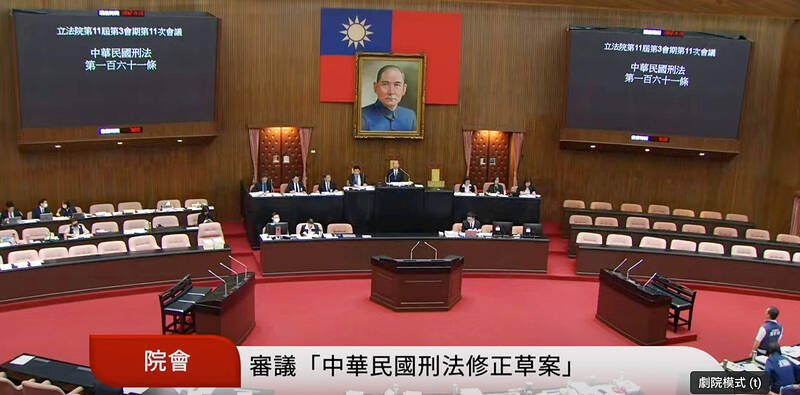Lawmakers on Tuesday passed amendments to the Criminal Code that add a new chapter on obstruction of justice, introducing offenses such as witness tampering and influence peddling.
The amendments were proposed by the Taiwan People’s Party (TPP). Party Chairman Huang Kuo-chang (黃國昌) said they stemmed from resolutions adopted at the 2017 National Conference on Judicial Reform.
Lawmakers from the Chinese Nationalist Party (KMT) also submitted related bills. The version passed was a consolidated draft backed by the KMT and the TPP.

Photo: Hsieh Chun-ling, Taipei Times
The Democratic Progressive Party (DPP) only agreed to the chapter title during interparty talks before the bills advanced to a third reading.
The new chapter includes provisions banning bribery involving witnesses, expert witnesses and interpreters, as well as criminal witness tampering and trading in influence to sway decisions by prosecutors or judges.
Bribery — including offering, soliciting or accepting payment — is punishable by up to three years in prison and a fine of up to NT$300,000 (US$9,906).
Witness tampering involving criminal activity can result in heavier penalties — up to half the maximum sentence for the related offense.
Trading in influence — using one’s position, connections, or access to power to sway the decisions of public officials — now carries a prison term of up to five years and a fine of NT$500,000.
Judges or prosecutors who accept such influence face one to seven years in prison and a NT$1 million fine.
Lawmakers also revised Article 161 to increase the maximum sentence for escaping custody from one to three years. If the escape causes damage to facilities or tools such as handcuffs or locks, the sentence increases to seven years.
Article 161-1 stipulates that it is a crime to abscond after being released on bail or other conditions, with a potential prison term of up to three years.
Huang said in a Facebook post on Tuesday that opposition parties passed the legislation 2,831 days after the 2017 judicial reform conference ended, accusing the DPP of dragging its feet on overhauling the system.
However, DPP legislators Puma Shen (沈伯洋) and Chung Chia-pin (鍾佳濱) expressed concern that the amendment does not explicitly include “exerting pressure” as a form of influence peddling.
In response, KMT lawmaker and former prosecutor Wu Tsung-hsien (吳宗憲) argued that while trading in influence is well-defined in Taiwanese law with significant legal precedent, “exerting pressure” lacks such clarity.

The Ministry of Education (MOE) is to launch a new program to encourage international students to stay in Taiwan and explore job opportunities here after graduation, Deputy Minister of Education Yeh Ping-cheng (葉丙成) said on Friday. The government would provide full scholarships for international students to further their studies for two years in Taiwan, so those who want to pursue a master’s degree can consider applying for the program, he said. The fields included are science, technology, engineering, mathematics, semiconductors and finance, Yeh added. The program, called “Intense 2+2,” would also assist international students who completed the two years of further studies in

Former president Tsai Ing-wen (蔡英文) departed for Europe on Friday night, with planned stops in Lithuania and Denmark. Tsai arrived at Taiwan Taoyuan International Airport on Friday night, but did not speak to reporters before departing. Tsai wrote on social media later that the purpose of the trip was to reaffirm the commitment of Taiwanese to working with democratic allies to promote regional security and stability, upholding freedom and democracy, and defending their homeland. She also expressed hope that through joint efforts, Taiwan and Europe would continue to be partners building up economic resilience on the global stage. The former president was to first

Taiwan will now have four additional national holidays after the Legislative Yuan passed an amendment today, which also made Labor Day a national holiday for all sectors. The Chinese Nationalist Party (KMT) and Taiwan People’s Party (TPP) used their majority in the Legislative Yuan to pass the amendment to the Act on Implementing Memorial Days and State Holidays (紀念日及節日實施辦法), which the parties jointly proposed, in its third and final reading today. The legislature passed the bill to amend the act, which is currently enforced administratively, raising it to the legal level. The new legislation recognizes Confucius’ birthday on Sept. 28, the

The Taipei District Court sentenced babysitters Liu Tsai-hsuan (劉彩萱) and Liu Jou-lin (劉若琳) to life and 18 years in prison respectively today for causing the death of a one-year-old boy in December 2023. The Taipei District Prosecutors’ Office said that Liu Tsai-hsuan was entrusted with the care of a one-year-old boy, nicknamed Kai Kai (剴剴), in August 2023 by the Child Welfare League Foundation. From Sept. 1 to Dec. 23 that year, she and her sister Liu Jou-lin allegedly committed acts of abuse against the boy, who was rushed to the hospital with severe injuries on Dec. 24, 2023, but did not